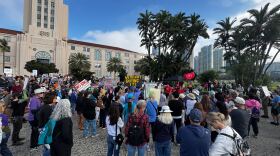Last week’s U.S. Immigration and Customs Enforcement raids in Mississippi, which led to the arrest of 680 people, was described as "record setting" raids in terms of size and scope.
But a statement released last Thursday by the U.S. Attorney's Office for the Southern District of Mississippi said that approximately 300 of them had been released.
Some 300 Arrested In Mississippi Immigration Raids Have Been Released, Officials Say
Does this signal a shift away from the targeting of people with criminal records, as was the priority under the Obama administration, and back to the days of large workplace raids, which were popularized under the George W. Bush era?
KPBS reporter Max Rivlin-Nadler spoke with the former acting head of ICE, John Sandweg, in our studio last week to discuss the raids, the change in tactics and why workers are often the ones targeted while employers are left off the hook.
Q: With the raids that resulted in the arrest of 680 undocumented workers in Mississippi, we didn’t see any charges against the employers, and instead just the workers themselves. Why is that?
A: I do think the focus of this operation was on making 600 arrests and then getting a lot of press. I think this was a significant goal in the way in which they conducted this operation. It takes a tremendous amount of manpower that you have to divert to make 600 arrests of civil immigration. None of these people are going to be a high-priority. Very few of them, if any, will have criminal histories in the United States, almost none of them pose an active threat to the United States. So the real reason they did this, obviously, was to generate as much publicity about the operation as is possible. But to be fair to the administration, I do think there is a criminal investigation ongoing as well. They were able to obtain search warrants. So these were warrants that were executed by a federal judge after demonstrating probable cause and typically in these federal criminal investigations, the search warrants precede any actual charges. So ultimately I feel as if some charges will be brought against the employers and possibly executives at the company, whether those charges are so significant that they justify the diversion of six-hundred special agents remains to be seen.
Q: Why is it so hard for employers to fill positions at these difficult, strenuous, and at times dangerous jobs. This was at a poultry plant, we know that people lose fingers, arms, all of the time. Why is it so hard for such an important part of our food system to be staffed by people who are here illegally?
A: It’s no secret that our economy relies on undocumented labor. The employers are not shy about that and that’s why the Chamber of Commerce and others support comprehensive immigration reform, to bring these people out of the shadows. But absolutely, when ICE is looking for worksite top operations, they know, very well, that they’re always going to find much larger numbers in these very difficult jobs. Agriculture, meat-packing, construction. That’s where you’re going to find your largest numbers of undocumented workers, in these kind of difficult and generally low-wage paying jobs, frankly because Americans are not willing to take them or employers are not willing to pay a wage that will entice Americans to take them, and candidly, consumers, all of us, are not willing to pay for chicken, the price that it would take to pay that competetive wage.
Q: Now a new was handed down less than a month ago, which basically would expand expedited removal, which allows ICE to remove someone from the country in a very short amount of time, to nationwide and not just within a certain area from the border. Would this raid, if this rule which is in effect, but as I understand it, has yet to be implemented by ICE, Would this raid be somewhere ICE could implement this new expedited removal rule?
A: Absolutely. This is exactly something I think the architects of expanding ‘expedited removal’ would want that rule to be used on. So what you would have is 600 individuals. Expedited removal, as a rule, cannot be used on anyone who has been in the United States for more than two years. In the regulation that ICE published, the immigrant has the burden to demonstrate that they’ve been continuously present in the United States for two years. That means even if you’ve been living here for ten years and you can demonstrate through leases or pay stubs or something of that nature, that you’ve been living in the U.S. for ten years, you have to demonstrate you didn’t even make a quick trip down to Mexico to visit family members or something of that nature. And the burden is on the immigrant. So what you’re looking at in a situation like this, and what concerns me, is you’re going to have individuals who are not legally eligible to be subject to expedited removal, but they’re sitting there at work one day and they’re apprehended by ICE. They have no opportunity to go home and have whatever evidence they might have available to them that would demonstrate they have been continuously present in the United States for two years, and those individuals would then run a risk, a very significant risk, that they would be subject to expedited removal, meaning they would be deported within days of their arrest and would not have the opportunity to go in front of an immigration judge and present whichever claims they would have that they’re either U.S. citizens or somehow eligible for an immigration benefit.









